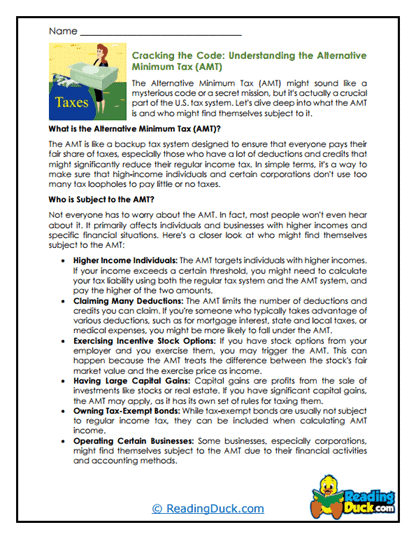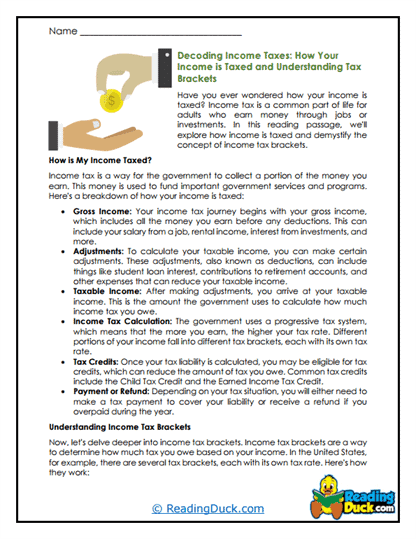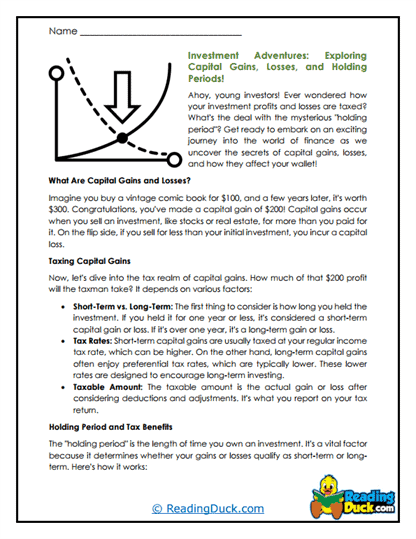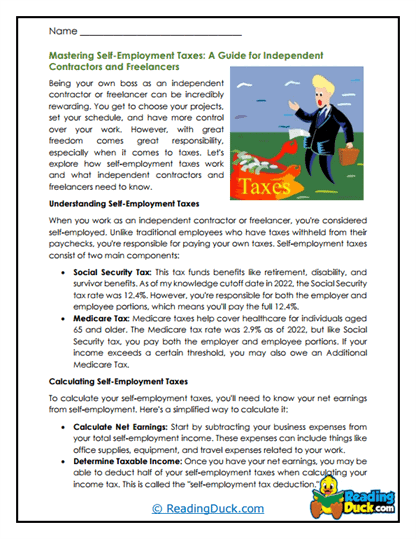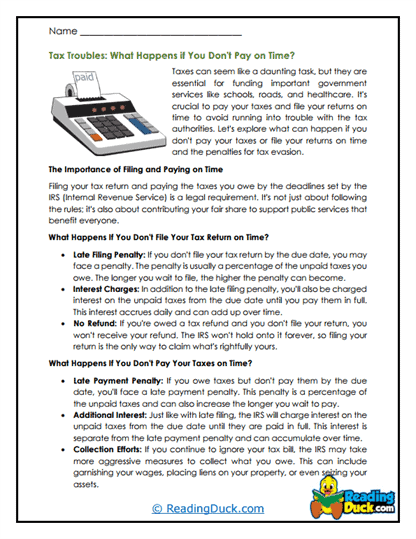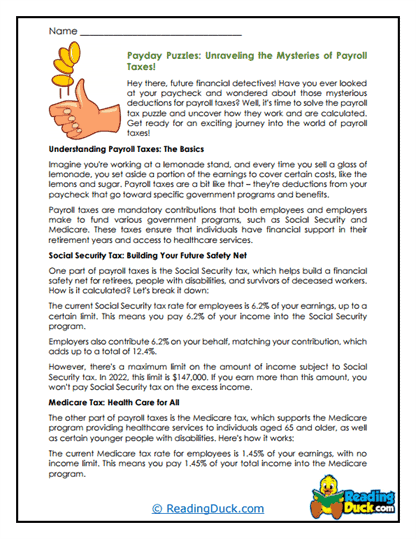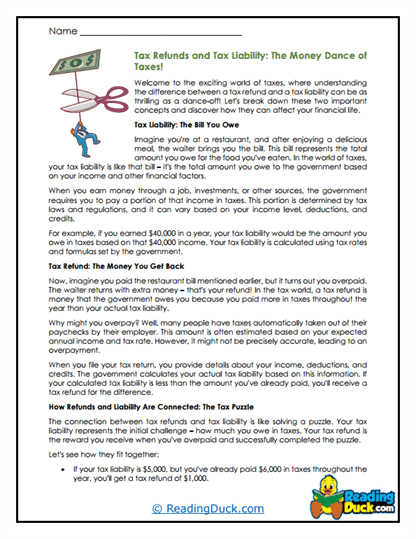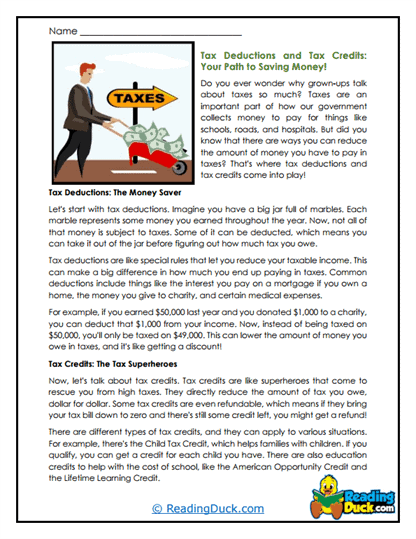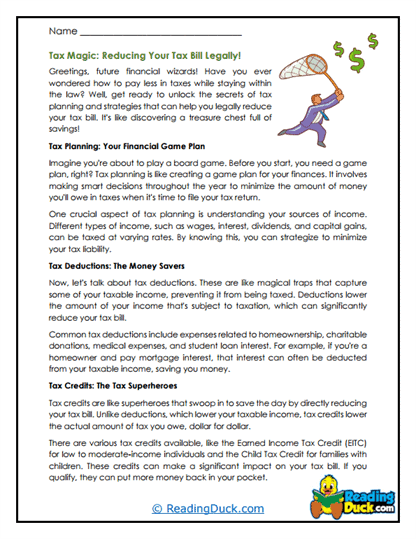Taxes Worksheets
About Our Taxes Worksheets
Our Taxes Worksheets are designed to help students understand the crucial role that taxes play in both the economy and their personal finances. As part of the broader Economics category, these worksheets cover various topics like Banking, Budgeting, Companies, Economic Systems, Financial Literacy, and more. The focus of this collection is to demystify the complexities of taxes, explaining how they function, why they are necessary, and how they impact everything from government services to individual budgets.
This topic contains several worksheet sets, each focusing on a specific aspect of taxes. Each worksheet set includes:
- Multiple Choice Questions: These questions assess students' comprehension of the reading passages, focusing on key details about different types of taxes, how taxes are calculated, and the purpose they serve in society.
- Short Answer Questions: Students provide concise responses, summarizing important information, analyzing tax scenarios, and reflecting on how taxes influence economic and personal financial decisions.
- Open-Ended Questions: These questions encourage students to think critically and express their personal interpretations, opinions, and preferences related to tax topics, helping them connect the material to their own experiences and future financial responsibilities.
These worksheets are designed to show students' level of understanding while enhancing their connection to the topic of taxes. An answer key is provided for each question sheet, making it easy for teachers and parents to evaluate student progress. All worksheets are available as PDF files, which can be easily viewed electronically, downloaded, and printed.
Understanding Taxes: The Backbone of Government and Society
Taxes are the financial backbone of modern society, funding everything from public schools and roads to healthcare and national defense. Understanding taxes is essential for anyone who earns money, spends money, or owns property—in other words, everyone. By studying taxes, students gain insight into how governments operate, how public services are funded, and how taxation affects both individuals and businesses. This knowledge is crucial not just for personal financial literacy but also for understanding the broader economic system.
When studying taxes, students encounter a variety of key concepts and areas of interest:
- Types of Taxes: Taxes come in many forms, each serving different purposes and affecting people in various ways. Students learn about the most common types of taxes, including income tax, sales tax, property tax, and corporate tax. They explore how these taxes are levied, who pays them, and how the revenue is used by governments. For instance, income taxes are typically progressive, meaning that higher earners pay a higher percentage of their income, while sales taxes are often regressive, affecting lower-income individuals more because they spend a larger proportion of their income on taxed goods.
- How Taxes Are Calculated: Understanding how taxes are calculated is essential for managing personal finances and making informed financial decisions. Students explore the process of calculating taxes, including the role of deductions, exemptions, and credits. They learn how to read a paycheck stub to see how income tax is deducted, how to calculate sales tax on a purchase, and how property taxes are assessed based on the value of real estate. This section equips students with practical skills they will use throughout their lives, helping them to budget effectively and avoid financial surprises.
- The Role of Government in Taxation: Governments use taxes to fund public goods and services that benefit society as a whole. Students examine the role of taxation in supporting infrastructure, education, public safety, and welfare programs. They also explore how governments decide on tax policies, including the balance between raising revenue and encouraging economic growth. Understanding this role helps students appreciate the importance of taxes in maintaining a functioning society and the complexities involved in tax policy decisions.
- The Impact of Taxes on the Economy: Taxes influence economic behavior in significant ways, affecting everything from consumer spending to business investment. Students learn how different types of taxes can encourage or discourage certain activities, such as how tax breaks for homeowners can stimulate the housing market or how high corporate taxes might discourage investment. They also explore the concept of tax incidence—who ultimately bears the burden of a tax, whether it’s the producer or the consumer. This analysis helps students understand the broader economic implications of tax policies and their effects on different groups within society.
- Tax Evasion and Avoidance: While taxes are necessary, not everyone pays them as they should. Students examine the differences between tax avoidance (legal strategies to minimize tax liability) and tax evasion (illegal actions to avoid paying taxes). They learn about the ethical and legal consequences of tax evasion and the importance of compliance with tax laws. This topic also touches on the role of government agencies like the IRS in enforcing tax laws and the measures taken to prevent tax fraud.
- Global Perspectives on Taxation: Tax systems vary widely around the world, reflecting different economic structures, cultural values, and governmental priorities. Students explore how different countries approach taxation, from flat taxes to progressive taxes, and how these systems impact economic inequality and social welfare. They also consider the challenges of international taxation, such as taxing multinational corporations and addressing tax havens. This global perspective helps students appreciate the diversity of tax systems and the ongoing debates about tax fairness and efficiency.
- Preparing for Tax Filing: As students approach adulthood, understanding how to file taxes becomes increasingly important. This section introduces students to the basics of tax filing, including the documents needed (such as W-2s and 1099s), the steps involved in filling out a tax return, and the differences between filing as an individual or a business. Students also learn about the importance of keeping accurate financial records throughout the year to ensure a smooth tax filing process. This practical knowledge prepares students for one of the key responsibilities of adulthood—filing their taxes accurately and on time.
Through these topics, students gain a comprehensive understanding of taxes as a critical element of both personal finance and the broader economic system. They learn to appreciate the necessity of taxes, the complexity of tax systems, and the importance of being an informed and responsible taxpayer.
Real-World Applications
Understanding taxes is essential for students as they prepare to enter the workforce, manage their finances, and contribute to society. Proficiency in this topic equips students with the knowledge and skills they need to navigate the tax system, whether they are preparing to file their first tax return, planning a budget, or making decisions about investments. By learning about taxes early on, students develop a solid foundation in financial literacy, which is crucial for achieving financial independence and security.
In the real world, the ability to understand and manage taxes is a valuable skill. Whether students plan to work in business, finance, law, or any other field, a solid understanding of taxes is crucial. Students who are well-versed in tax concepts are better equipped to make informed decisions about their financial future, from optimizing their tax deductions to understanding the implications of tax policies on their income and investments.
Moreover, tax knowledge is important for understanding broader economic issues. Students who understand how taxes work are better able to interpret economic indicators, evaluate the impact of government policies, and understand the financial news. This knowledge is invaluable for anyone looking to stay informed about the global economy and make sound financial decisions.
Using These Worksheets In A Curriculum
These taxes worksheets can be seamlessly integrated into various subjects and classes, particularly in economics, social studies, and personal finance courses. For middle school students, these worksheets introduce the basics of taxation, helping them understand why taxes are necessary and how they affect daily life. For high school students, the worksheets can be used in more advanced courses to explore complex tax concepts, such as tax policy, tax incidence, and global tax systems. Additionally, these worksheets can be incorporated into real-world applications, such as calculating potential tax liabilities or analyzing the effects of a proposed tax law, to give students hands-on experience with tax concepts.
These worksheets not only reinforce key economic principles but also help students develop critical thinking and analytical skills. By analyzing real-world tax scenarios and answering questions that require them to apply their knowledge, students build a strong foundation in financial literacy that will serve them well throughout their lives.
Overall, the Taxes Worksheets provide a comprehensive and engaging way for students to explore the importance of taxes in economics, gain a deeper understanding of the tax system, and develop the skills they need to navigate the world of finance successfully.
